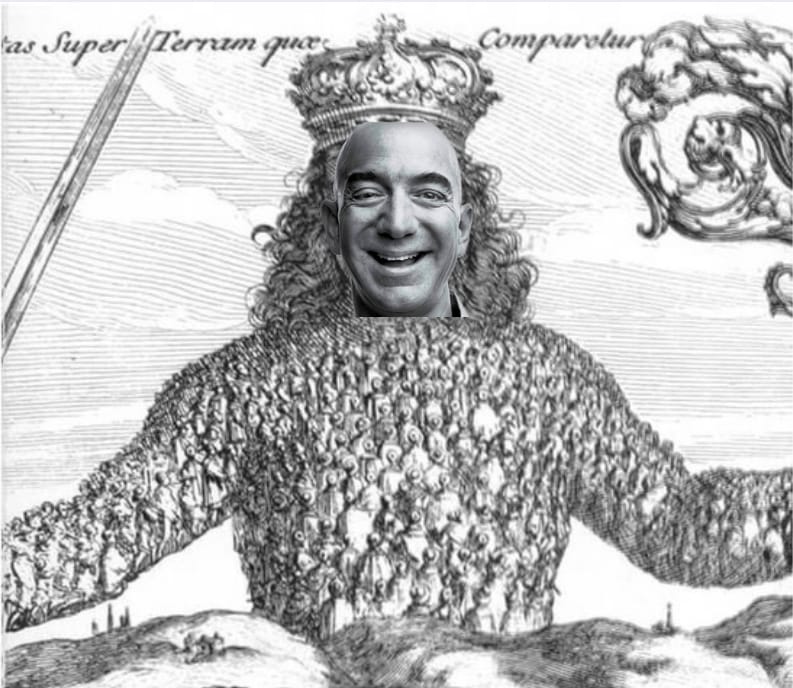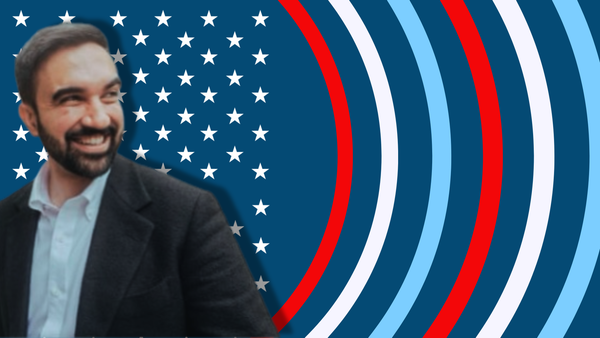At a certain point, you just get feudalism

I state upfront my resistance to mechanistic explanations of sociopolitical/socioeconomic circumstances. Not that none exist. But the urge to believe “X naturally leads to Y” as an explanation for any given problem is stronger than the incidence of such explanations is high.
That said, consider Jeff Bezos. Consider his pitch to investors in the 90s (chiefly his parents). He, a young hedge fund manager, thought he’d make a great candidate to launch an online bookstore. E-commerce was still young enough at that time that saying “e-commerce” kind of hurt your mouth. There were already online bookstores, none of which were making huge money, and Jeff Bezos had never been a librarian.
To add an extremely relevant cherry on top, he intended to run the company at a long term loss in order to scale quickly.
But why?
This is a story we all know. Most Americans are Amazon Prime members now, even though the pocketbook benefits are somewhat inconsistent. He began with books because they’re efficient to ship, in demand evenly across the country, and therefore, provided an easy launch point for a scalable national shipping process. From this logic, he has injected Amazon into everything he can, from movie production to cybersecurity to fucking space.
We used to joke that a robber baron had the wealth of a small country, but Bezos and his tech baron peers actually do. Sort of.
Sort of. But not really. It’s actually much worse than that.
The reason Jeff couldn’t just purchase, for example, all Hungary is that he doesn’t actually have that much money. Not as cash, anyway. His wealth is almost entirely determined by the value of his assets. He extracts liquid cash from those assets with low interest loans against the assets. Again, this is a story you probably know.
But the death of capitalism is hiding in this equation.
Capitalism, as we know, is a mode of production characterized by the private ownership of capital and the exploitation of labor and natural resources to produce profits. Those profits are then reinvested into more capital, more labor, or more resources, which in turn creates more profits and so on. Profits remain the end in view.
The problem the tech barons present for capitalism is that profits no longer matter, as such. Through their companies, they are, in a very real sense, Too Big To Fail. There is no competitor who could truly threaten them and no crisis they could not leverage for more of what they want.
The end in view for Jeff Bezos’ aggressive growth strategy is market capture. He wanted it all. He’s essentially gotten it. His strategy has become hegemonic among his class, and now the biggest winners of the Disruption Wars hold a kind of wealth seldom matched in history and wield technologies no monarch nor emperor could’ve dreamt of.
Profits are superfluous. What they want is control.
I think that’s natural. Perfectly natural. A perfectly natural, but deeply inhuman, evil revolution is happening right now, everywhere.
In the same way the transition from protectionist mercantilism with its monarchs to capitalism with its parliaments was a result of the growing capitalist class asserting their own best interests, this present revolution is the assertion of the tech barons’ own best interests.
Modern states evolved to help carve markets into the optimal shapes for profit extraction. They set rules and (more or less) enforce them. They externalize certain kinds of costs, like environmental damage. They make sure labor doesn’t get too excitable. They may not till the soil and sew the seed, but they do clear the land and issue the deed. This doesn’t produce fairness. The complaint that capitalism inherently produces a class of winners and a class of losers is essentially true as an absolute feature of the system.
But it is fairer by far than what it replaced, and (with the help of strong democratic states) had the potential to grow fairer still.
Until now. The best interests of the tech barons have begun to change. Largely American, they latched onto the considerable power of the American economy, its friendly regulatory environment, its existing mythos, and (with the help of a decade-plus of almost free money) created world-bestriding empires in the seams between society’s interlocking parts. Facebook monetized human connection. Google created a Spreadsheet of Everything. Of course, Amazon sprayed itself all over the economy. Tesla monetized memes.
But the problem with all this is that those seams can’t be very wide without civilization’s stuffing bursting out. That is happening now. Facebook didn’t actually monetize human connection, Meta leveraged it into an endless supply of free data for advertisers and then spent over a decade honing precision ad placement. Google gradually made history’s most useful spreadsheet so unfriendly it now requires a class of specialist priests to call up even mumbled truths from its depths. Tesla’s stock price is so divorced from its value as a company, it appears almost miraculous.
Which means either God holds Tesla stock, or the whole thing’s a scam. Google’s broken search engine gives different answers to identical questions from different users. Facebook has created bespoke information silos for its advertisers to scrounge around in like rats, but the hallucinations of consensus these echo chambers produce is rapidly turning grandmas into suicide bombers.
These firms aren’t just firms. They’re the expressions of their owners. And they’ve gotten way, way, way too big.
They no longer need governments. They no longer even need profits. What they want is control.
What they need is rent.
Rent means reliable revenue streams. Renters reliably produce free data, which can be sold on to advertisers—who themselves also owe rent for the service. Rent means your customers may not even meaningfully own what you’ve sold them if it’s not a physical product (or maybe even if it is).
The appeal of this is no longer really money. It’s leverage over the economy. If you’re Too Big To Fail, you’re the first in line for the big bailout when the market crashes. Maybe a little discretionary burn here and there to buy a regulatory favor. Donate to an inauguration party and the president’s people make sure your merger gets approved.
All these big little favors you then reinvest into more ownership, more power, more leverage over more of the economy. Maybe you build a service and buy out your competitors, so now no business can go without you, creating more renters, more leverage, and so on. Maybe you’re Elon Musk and you really go for it. You buy your way into the White House and dropship a throne behind the Resolute Desk. Now you’ve maybe bought a king.
Not for the first time in American history, we are reinventing feudalism.
In my read, this is a function of inequality. Yes, it’s also a driver of inequality. It’s a vicious cycle, but the fix lies in addressing inequality, rather than just playing whack-a-mole with antitrust action (though we should do that too).
Let me hesitate here one more time. The temptation to accept mechanistic explanations for these kinds of problems is strong. I’m not offering one here. At least, not an automatic or even overdetermined one. Inequality creates the mechanism, but the machine probably needs a few donkeys to turn the wheels.
That said, inequality does have inevitable effects. Runaway inequality inevitably squeezes incomes. Top earners always have more money by far than they need, which allows them to overbid on authentically scarce commodities and services, which drives costs for lower income earners. Unlike profits in Reaganomics, this surplus does trickle down. All the way to the bottom. It’s inflationary. As it progresses, it makes life gradually less and less affordable for lower and lower rungs of the income ladder. Take a gander at the most unequal post-industrial economies and you’ll find an attendant housing crisis, and a housing crisis always drives a more general affordability crisis.
You can see how this creates more renters in the housing sense. Poorer home owners get leveraged out of their homes by wealthier buyers, but because we’re in a housing crisis, they cannot afford to buy anything cheaper, and become renters. Because they sold their home rather than passing it to their children, their children can’t get onto the property ladder. You now have a class of renters.
The innovation of the tech barons is to create many more kinds of renters. It bears mentioning how many of them also happened to make their billions building the “gig economy.” Which is to say, building a sector of the economy where all the labor is precarious, contingent, and insufficient for human thriving. Technology serfs for the feudalist future. Benn Jordan called this Digital Sharecropping. I like that. It reminds us of the last time America reinvented a kind of feudalism.
My argument is that this Digital Sharecropping emerges as a result of inequality at a certain level. Maybe more probabilistically than mechanistically, but nonetheless, the relationship is causal. Inequality creates more of itself. Eventually a change in quantity becomes a change in kind. The incentive moves from profits to rents, and rent-seeking begins to take over the economy. Without intervention, capitalism crumbles under the weight of its most successful capitalists, and we’re a nation of tenant farmers, company towns, and crypto-scrip. No longer any kind of market economy, but a relational economy. In a word, feudalism.
Fortunately, we have a model for this. The way out is recapturing the state and rehydrating our desiccated democracy. They will not make it easy because they never have. There’s a great argument to be made that the gains tech workers made during the pandemic catalyzed a radicalization of the tech barons that accelerated the conclusion we’re now living through. That is to say, in some sense this is a tantrum.
But it’s a tantrum enabled by a failure of our institutions and an abdication of our values. We let ourselves be subjugated. We should recall that we are a people who have never met our betters.
Related:
“You Are Witnessing the Death of American Capitalism,” by Benn Jordan. YouTube.
“Why Labour is crushing your living standards,” by Gary Stevenson. YouTube.



